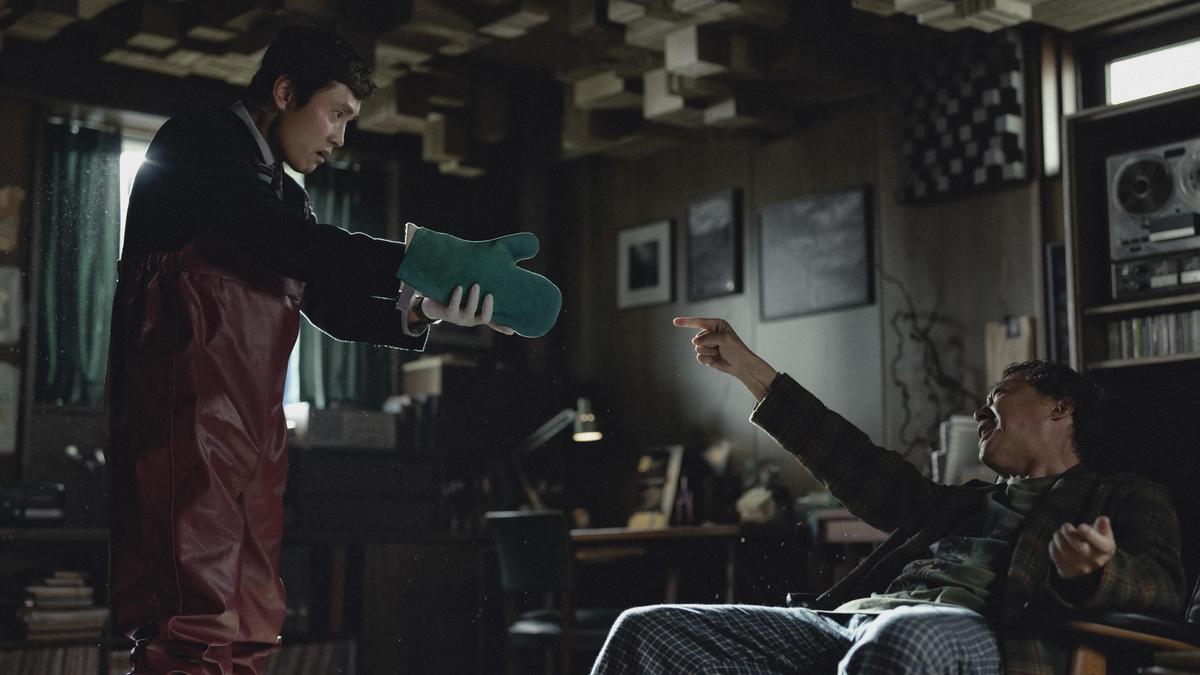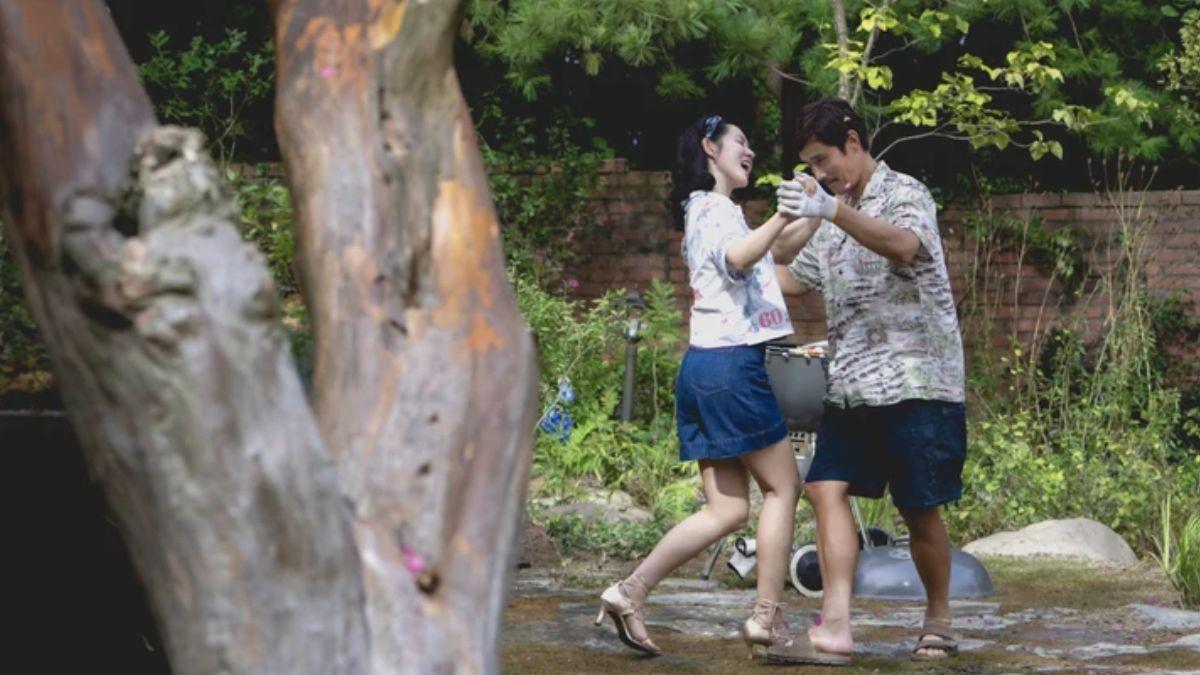Somehow a 9AM festival crowd turned into a Park Chan-wook congregation here at IFFI Goa, and the man rewarded us all with a delicious suburban infomercial that blossoms into the sort of razor work only he can get away with. So this is why cinephiles treat him like a minor deity…
Adapted from The Ax by Donald Westlake, No Other Choice is a surgical takedown of the idea that steady pay checks are a redundant architecture of moralisms. It is also PCW’s funniest, angriest, and most ruthlessly clear-eyed assault on capitalism since his earlier vengeance cycle, and it wears all of its snark and spite like a bespoke rubber onesie.
No Other Choice (Korean)
Director: Park Chan-wook
Cast: Lee Byung-hun, Son Ye-jin, Park Hee-soon, Lee Sung-min, Yeom Hye-ran, and Cha Seung-won
Runtime: 139 minutes
Storyline: Abruptly laid off after 25 years at the same company, a desperate man goes to extreme lengths to eliminate the competition for the job he wants
The plot is simple and horrifically specific. Yoo Man-su, played by Lee Byung-hun with a mix of mortified dignity and cartoonish panic, is a paper-industry lifer whose life is scaffolded around his résumé. When American investors buy the firm and cut jobs, Man-su’s comfortable world unravels.
Rather than change course, he starts to scheme. To Man-su, losing his job is an axing of identity (or his fragile male ego) that is tantamount to sacrilege. He posts a fake job ad, stalks rivals, and 3D-prints a replacement for his family’s heirloom gun, before the bodies begin to pile up. PCW tracks this descent with a detached amusement that never softens into sympathy for entitlement. But what the veteran Korean auteur refuses to let us forget is how ordinary that logic feels when framed as a ‘survival-of-the-fittest’.
A still from ‘No Other Choice’
| Photo Credit:
CJ Entertainment
PCW’s anti-capitalist satire is so effective because he understands the machinery of humiliation. He stages corporate cruelty as bureaucratic theatre, with severance affirmation workshops that dress up disposability. The film treats these niceties as insults. Each corporate euphemism is a prop that nudges people toward moral vacancy. All the chuckles the film generates are acidic because they emerge from a deep-seated recognition. We see colleagues trained to pat you on the back and wish you the best in the moment of layoff. We watch a family cancel Netflix, sell cars and reassign dogs like movable liabilities. The indignities are mundane and therefore devastating.
Visually, this is PCW at his most cunning since 2022’s Decision to Leave. Kim Woo-hyung’s cinematography composes suburban geometry into a terrain of insidious traps. PCW loves a good architectural joke, like a greenhouse becoming a mortuary, or a family swing announcing a sense of dread as it bobs. The film is edited with a gleefully creative abandon. Match cuts and whip pans are functional diagrams that transpose Man-su’s private panic onto the public choreography of work. And PCW’s long-time composer Jo Yeong-wook, provides a baroque pulse that keeps the tone buoyant until it rips away the buoyancy towards the finale.
Lee Byung-hun gives an astonishing performance. He makes Man-su pitiable and grotesque at once. The actor calibrates humiliation with a kind of suburban performative masculinity that looks ridiculous until dangerous. Son Ye-jin’s Mi-ri is the better moral compass, though still compromised. She is practical, exhausted, and infinitely sadder than the movie needs her to be. Her final choices function as the film’s climactic fulcrum and PCW trusts her to carry the residue of decisions one would rather term survival.
The film’s humour is cruel and precise, and PCW treats the multiple homicides as logistical problems gone naive. Man-su’s bungled attempts create a farce of desperation, yet the comedy never lets him off the hook. The laughs are a mechanism for moral lucidity and PCW wants us to feel how easily the system reconfigures compassion into calculation. That realisation is disconcerting. It means the villain isn’t so much the man with the gun, but the system that makes murder seem like a rational investment in stability.

A still from ‘No Other Choice’
| Photo Credit:
CJ Entertainment
PCW stages No Other Choice as an auto-parasitic meditation on capitalism’s talent for conscripting its subjects into their own undoing, that recalls Marx’s diagnosis of alienated labour and the Foucauldian idea of self-regulating power. Man-su becomes a conduit through which the system metabolises fear into obedience, converting personal crises into corporate utility, and exposing how contemporary economies thrive on individuals who internalise the violence that once required an external sovereign. And in rendering the brittle male ego as a precarious edifice propped up by labour, status, and the fantasy of indispensability, PCW simultaneously exposes masculinity as a governance technology whose fragility becomes the fuel and the fallout of late-capitalist collapse.

There are affinities with other Korean satires. Comparisons to Parasite are inevitable, and PCW’s film shares a saturnine humour with Bong Joon-ho’s focus on how class shapes interior life. But PCW sharpens a different, more elegant blade here. Social satires tend to dramatise inequality as a clash of households, but No Other Choice narrows in on the professional identity that capitalism breeds. It shows how a system that sells dignity as a benefit can in practice, withdraw it like a service.

A still from ‘No Other Choice’
| Photo Credit:
CJ Entertainment
If the film has a flaw it is a moral architecture that sometimes feels a tad too clinical. PCW’s aesthetic precision is replete with moments of theatricality where the script wants the raw edges to bleed more. Still, that formal control is also the film’s métier. PCW is adept at making cruelty look gorgeously stylised so that all the glorious ugliness hits harder.
This film is bleak, but it also carries a scalding tenderness. Its messaging points towards those desperations when institutions declare humans redundant, and people respond in ways that reveal the institutions’ deepest cruelty. There is also a particularly bankrupt final image that stings because it refuses easy moral closure. PCW leaves us watching someone who has survived in a world that has been wrenched toward mechanisation and says, in effect, that surviving is not the same as living.

No Other Choice is PCW’s playful, poisonous fable about how work becomes selfhood and how losing work can feel like an existential theft. It’s hard to think of a more relevant satire in a year when job security is vapour and algorithms promise to make human labour optional, and PCW proves how terrifyingly plausible the absurdity is. It’s a small masterpiece of misanthropic sympathy.
No Other Choice was screened at the ongoing 56th International Film Festival of India in Goa
Published – November 21, 2025 08:38 pm IST
www.thehindu.com (Article Sourced Website)
#IFFI #Choice #movie #review #Park #Chanwooks #brilliant #autoparasitic #critique #capitalism
